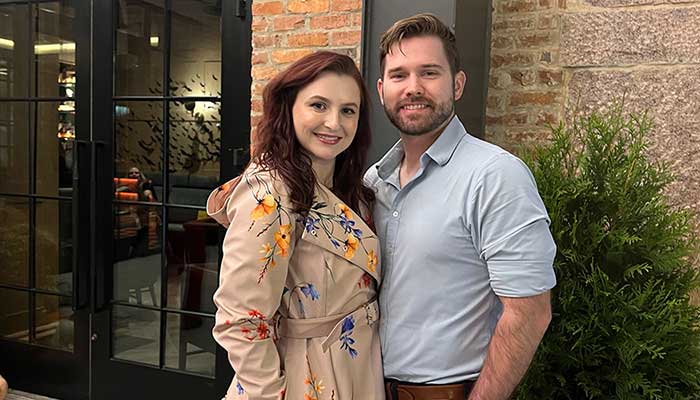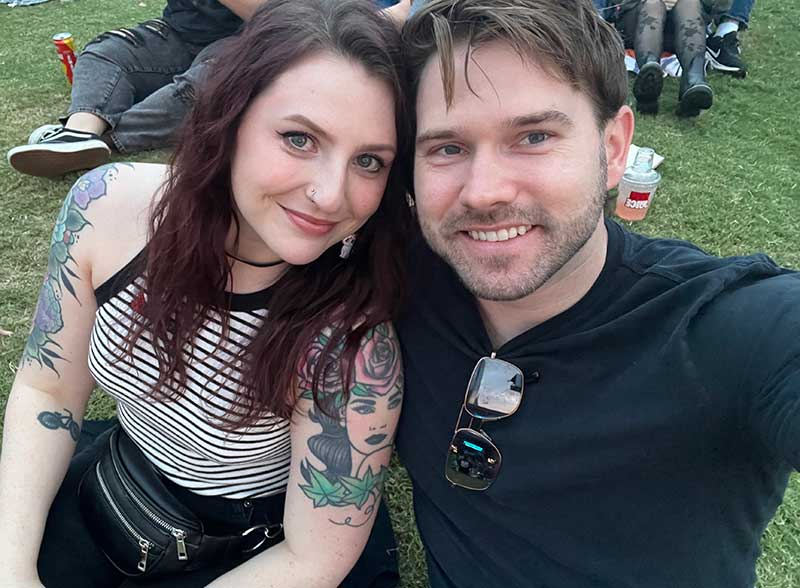Dr. Mitchell Gigandet served four years in the Marines in Afghanistan prior to returning to school to pursue a medical career. While he didn’t initially seek out sleep medicine, the experience of helping his patients dramatically improve their quality of life has made it a rewarding specialty. In his free time, Dr. Gigandet and his wife keep a busy concert schedule and enjoy Nashville’s scrumptious restaurant scene.

What is your background and how did your path lead to Neurology?
It definitely wasn’t a smooth path! I was raised in Clarksville. I was always interested in science, but after high school I decided to join the Marines. I served in the infantry from 2008 unti 2012. I completed two deployments in Afghanistan. That experience taught me a lot; one of the main things is that I wanted to go back to school and become a doctor.
After I left the service, I went to do my undergrad at Bridgewater College in Virginia. It was a small school that took the GI bill, so that’s how I ended up there. Afterwards I attended the University of Kentucky for medical school. That’s where I met my wife. I did my internal medicine residency at Wake Forest. At that point, I wasn’t really aware of sleep medicine as a career. Most of the sleep medicine doctors at Wake Forest were pulmonary critical care doctors who did sleep kind of on the side. While I was shadowing them, I got my first exposure to sleep medicine. After talking to them, I decided to apply for a sleep fellowship instead of pulmonary critical care. So I did my sleep medicine fellowship at Duke.
What sparked your interest in sleep medicine?
I really enjoy practicing it because sleep disorders are so common. Everyone knows what it’s like to go without sleep, so you can understand how miserable people can become when they get poor sleep for months or years at a time. Sleep medicine is unique in that, because everyone is so symptomatic, you really get to see your results and how you’re helping. It feels good as a doctor because you can look at your patients and see that they are feeling better. A good night's sleep changes people’s lives, so sleep medicine is rewarding. We’re learning more about the importance of sleep for daytime function and long term health as well. It is a fast growing specialty and there is such a need for it.
How did you end up at Vanderbilt? What are some qualities that attracted you to VUMC?
When I was done with my fellowship, my wife was also finishing up her psychiatry residency at the University of North Carolina, so we ultimately were looking for a place where we could both practice. After decades of not being at home, I finally made it back. My family is here around Nashville, so Vanderbilt was an easy choice for us. It’s a great institution, and because it’s also an educational institution, if you want to teach or work with trainees you can do that. The people here have been so welcoming and accommodating, especially Dr. Kelly Brown who helped make my transition from being a fellow to attending so smooth. It’s also been great for my wife, who is doing psychiatry here, and they were able to help get her everything she wanted in a career as well.

What does your typical week look like?
I mostly do clinical work now. I am in the clinic three full days per week, then I do a half day of telehealth and some sleep study reading time. I’m not doing any research right now, but I’m one of the co-directors for the continuing medical education (CME) program. I am responsible for helping set up all the sleep medicine grand rounds. I reach out to different providers and researchers around the United States and ask them to present to all of us, but especially to our sleep medicine fellows.
What are some emerging research findings in sleep medicine that you are particularly interested in or excited about?
All over the news of course are the new GLP-1 medications for obesity and sleep apnea. CPAP machines are the first line of treatment for sleep apnea, but they are not for everybody. If someone can’t tolerate the machine, sleep apnea can be difficult to treat. So these medications are getting approved for moderate to severe sleep apnea. I think these are going to be used a lot more in our practice as an alternative to CPAP machines.
I also really enjoy treating Restless Leg Syndrome (RLS). These patients are really suffering. There’s growing excitement about wearable devices that don’t require medications to help treat RLS.
What does a free weekend look like for you? What are some of your favorite spots around Nashville?
My wife and I are really big into music, which is great around here. We’ve been to so many concerts and shows. Every weekend we try to go to a concert, which is something you can really do in Nashville. All of the different venues–Ascend, Bridgestone, Pinnacle–if there’s a show and we have time, we’re probably going to go. I’ve checked a lot of artists off my bucket list here.
We primarily like rock and classic rock. Lately we’ve taken the opportunity to see some of the bands who have been around for a long time, like AC/DC and Metallica. A lot of people think you can only find country music in Nashville, but that’s not true.
Some of our favorite restaurants are Hampton Social, Maru Sushi, Bringles, and Butcher and Bee. Food and music is kind of what we do! We like sports as well—especially Nashville SC, and it’s great that they’re good this year.
What are you currently watching?
I’m still obsessed with The Office even after all these years. It’s always on in the background. We also watch a lot of cooking shows too. We are big Gordon Ramsey fans.
Who have been some important mentors for you along the way?
James McGuirk is another sleep medicine doctor just a few years older than me. He knows the department and VUMC really well. He’s been someone I’ve been able to talk to about my day to day questions. Another important person for me has been Doris Sparks, a nurse who works in our Pleasant View clinic. Estefania is a medical assistant there as well. They are just fantastic; they really keep the clinic moving and I couldn’t do it without them.